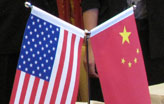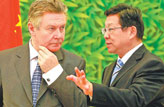Op-Ed Contributors
Tibet card won't help Obama
Updated: 2011-07-20 08:14
By Andre Vltchek (China Daily)
It seems to be no secret that US President Barack Obama is deeply mired in his country's economic mess. Recovery is painfully slow, unemployment (and under-employment) persistently soaring. The debt crisis is profound, while the overall mood on American streets appears to be gloomy, parallel to continuous social decline. Medical reforms are on hold, some say permanently stalled.
On the foreign front, the Afghanistan War is dragging, described by many experts as "unwinnable", the Libyan campaign is turning into an embarrassment and the rest of the African continent - from the Democratic Republic of Congo to Somalia, Rwanda and Uganda - is suffering from aggressive US policies geared to covert plunder of natural resources.
There is very little to celebrate as the 2012 US presidential election approaches. Many voters still remember the moving "Yes We Can!" rallying cry but are now asking what exactly it was all about.
It seems that one way to gain a breath of air and some rest from political pressure would be to attack someone else, preferably a country that is doing much better on both economic and social fronts.
And so, as a well-tested workhorse of Western propaganda, the Dalai Lama visited White House on July 16 to give, simply by his presence, support to the embattled US president and the whole system.
China immediately lodged a protest accusing Obama of undermining relations between the two countries. But acts like this play well in some circles of the inward looking country that is the US. By inviting the Dalai Lama, Obama showed to Republicans that he is "tough on China" and "indifferent of foreign pressure".
Just as an American scholar says, in the US, the Dalai Lama is portrayed as a religious symbol - a holy man - and who would not feel sympathy for the old man who likes to fix watches.
Naturally, the Dalai Lama's visit to Washington brought no gain to American voters. And there was nothing particularly brave or innovative about Obama's invitation: for decades, the Dalai Lama has been willingly traveling the world, criticizing China, offering a helping hand to politicians who believe that the West has a moral mandate to teach the universe about good governance and human rights, despite its own dreadful colonial past and neo-colonial present.
For certain reasons, many in the US establishment see confronting China as a brave and productive act. In reality, such an approach simply diverts the Western public's attention from real issues and undermines the prospects for peaceful coexistence between the West and the most populous nation on earth, which is now also the second largest economy.
As the 2012 presidential election approaches, the struggle between the Republicans and Democrats is escalating. The Republicans have been blocking almost all progressive legislations proposed by Obama, and even trying to reverse those that have been adopted such as those concerning healthcare.
Obama needs to fight back, but the embarrassing domestic political and economic gridlock has once again translated into an unfortunate China bash. And this time he has taken the Tibet card, while the Dalai Lama is eager to shift the world's focus from the achievements of Tibet after 60 years of peaceful liberalization to the Tibetan separatists.
Arrives a small bespectacled man with pre-arranged smile, well-choreographed gestures and clear agenda. Servile exchanges follow. This is what the Dalai Lama said in reply to a question from AFP: "Obama is 'president of the greatest democratic country, so naturally he is showing concern about basic human values, human rights, religious freedom'."
It has to be noted that the issues of human rights and human values are not always on top of the agenda of this former feudal lord, especially when they are being grossly violated by the "greatest democratic country" itself or by other Western powers. The Dalai Lama's criticism is almost exclusively reserved for China or some other countries that aim at an independent course of economic, social and political development.
The Obama-Dalai Lama meeting faced strong protest from China. It will damage Sino-US ties, but to what extent is not yet clear.
On one hand, China is by now accustomed to unfriendly outbursts from Western leaders, whenever they feel the need to flex their muscles or to escape scrutiny at home. On the other, hosting a person openly hostile to China and its unity in the White House is certainly a very serious act. To put it in perspective, it would be the same as the Chinese government officially inviting an individual hell-bent on seceding one of the states of the United States.
This game is foolish. China and the US live under two different systems but their economies are intertwined. Also, hostility is not something that the US could afford.
As The Telegraph reported on July 17: "Obama's meeting came at an especially sensitive moment, with leaders in Washington at odds over how to raise the $14.3 trillion US debt ceiling in time to avoid default. China holds more than $1 trillion in US Treasury debt and would be particularly exposed should Congress fail to reach a deal by Aug 2. A US default could rocket up interest rates, sink the value of the US dollar and hurt the global economy."
It would be wise for US politicians to concentrate on their own economic and social issues, instead of interfering in the domestic affairs of other countries to cover Washington's decline.
The author is an American novelist, documentary filmmaker and investigative journalist.
(China Daily 07/20/2011 page9)

Specials

China-US Governors Forum
The first China-US Governors Forum is held July 15 in the Salt Lake City, the United States.

My China story
Foreign readers are invited to share your China stories.

Rare earths export quota
China kept its export quota at almost the same level as last year.